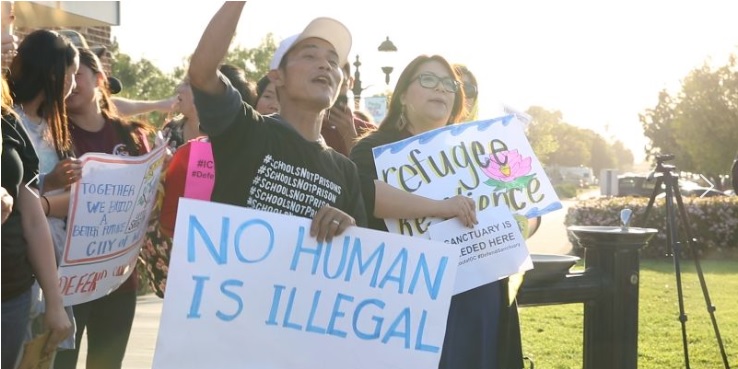
By Sandra De Anda, (OCIYU)
On November 21, word of Tung Nguyen’s pardon by Governor Jerry Brown began circulating on social media with congratulatory words for the Orange County resident. Nguyen served time in prison for crimes of murder and robbery that happened in 1994 when he was 16, but already earned early release from Brown in 2011 because of exemplary behavior and the fact that he himself didn’t stab anyone in the fight outside a hotel. As reported by the Los Angeles Times, Nguyen counted himself among Brown’s “38 pardons for people convicted of felonies who had completed their sentences and commuted the existing sentences of 70 more.”
This act of clemency is being described by many local immigration rights organizers and even Nguyen himself, as “one in a million.” Nguyen’s conviction played a key role in the Vietnamese refugee’s removal orders. Gaining a pardon may help him stay in the United States.
The seemingly improbable pardon became something tangible with letter writing support from the community for Nguyen and others like him, including another local named Hai Nguyen, who helped Nguyen “found the reentry organization for inmates and has volunteered with the Anti-Recidivism Coalition, a Los Angeles-based nonprofit organization started by Hollywood producer Scott Budnick to provide a support network for people who have been incarcerated.”
Apart from that, deportation issues received a spotlight at the recent Vietnamese American Arts and Letters Association (VALAA) Viet Film Festival, especially with the screening of the Lan Nguyen directed short film Bi Ket about Nguyen’s release from prison. Community support in a variety of ways helped Nguyen’s case garner attention that ultimately proved pivotal. In exchange for the support, Nguyen and Hai have been very vocal about their experiences integrating back into the Vietnamese community where discussing issues of criminality has typically been seen as taboo.
“Just recently, local Vietnamese television has begun to shed more light on progressive issues,” Nguyen says, after doing an interview about his pardon with a local Vietnamese news show. Changing attitudes in the community proved to be a driving force in both of the pardon campaigns. “It’s a relief but it doesn’t stop there,” Hai says. “We have to continue following the law and helping people understand that once you get pardoned that still doesn’t mean you’re off the hook.”
Nguyen also gave voice to a notion that he surmises should become common knowledge among the Vietnamese community during this time. “Even if you are a Vietnamese refugee who came to the U.S. before July 12, 1995 and it was honored before that you can’t be removed under a longstanding agreement with Vietnam, this is no longer true,” Nguyen says. “You will need to find legal representation if you have final removal orders.”
And removal proceedings is where attention turns to next for both. In the meantime, Nguyen and Hai have taught us that educating communities is essential to such campaigns, and when coupled with community support, that’s what wins cases.

Deport This! is a partnership between OC Weekly, Chispa and Orange County Immigrant Youth United. The column is a rebuttal of Donald Trump’s racist politics and his OC cheerleaders, who’ll no doubt get triggered every week with news and views by and about the undocumented community.

